

Hipsters On Food Stamps, Part 1. Examining the Means-tested Welfare State. Social Security Administration: Social Security Basic Facts. Social Security Basic Facts (Printer Friendly Version) April 2, 2014 In 2014, over 59 million Americans will receive almost $863 billion in Social Security benefits.
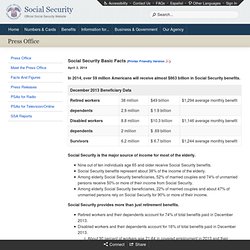
Social Security is the major source of income for most of the elderly. Nine out of ten individuals age 65 and older receive Social Security benefits. Medicare Spending and Financing Fact Sheet. Nov 14, 2012 Overview of Medicare Spending Medicare, the federal health insurance program for over 50 million elderly and disabled Americans, helps to pay for hospital and physician visits, prescription drugs, and other acute and post-acute services.
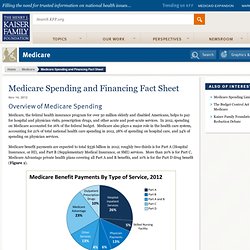
In 2012, spending on Medicare accounted for 16% of the federal budget. Medicare also plays a major role in the health care system, accounting for 21% of total national health care spending in 2012, 28% of spending on hospital care, and 24% of spending on physician services. Medicare benefit payments are expected to total $536 billion in 2012; roughly two-thirds is for Part A (Hospital Insurance, or HI), and Part B (Supplementary Medical Insurance, or SMI) services. Figure 1. Medicare Spending Growth Total Medicare spending is projected to nearly double from $592 billion in 2013 to $1.1 trillion in 2023 due to growth in the Medicare population and sustained increases in health care costs (CBO, February 2013).
Www.dol.gov/dol/budget/2013/PDF/FY2013BIB.pdf. The 2014 Long-Term Budget Outlook in 26 Slides. A guaranteed income for every American would eliminate poverty — and it wouldn't destroy the economy. Report: U.S. Spent $3.7 Trillion on Welfare Over Last 5 Years. New research from the Republicans on the Senate Budget Committee shows that over the last 5 years, the U.S. has spent about $3.7 trillion on welfare.

Here's a chart, showing that spending versus transportation, education, and NASA spending: "We have just concluded the 5th fiscal year since President Obama took office. During those five years, the federal government has spent a total $3.7 trillion on approximately 80 different means-tested poverty and welfare programs. How to Fix Poverty: Write Every Family a Basic Income Check. In the United States—as in all of the world’s wealthier nations—ending poverty is not a matter of resources.
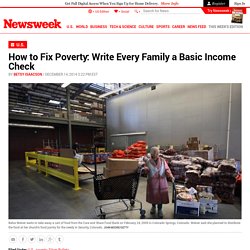
Many economists, including Timothy Smeeding of the University of Wisconsin (and former director of the Institute for Research on Poverty) have argued that every developed nation has the financial wherewithal to eradicate poverty. In large part this is because post-industrial productivity has reached the point where to suggest a deficit in resources is laughably disingenuous. And despite the occasional political grandstanding against welfare, there is no policy, ideology or political party that is on the books as pro-starvation, pro-homelessness, pro-death or anti-dignity. Yet, poverty continues to exist. In the U.S., for example, almost 15 percent of citizens (and almost 20 percent of children) live in poverty. The main problem is logistical. Try Newsweek for only $1.25 per week. 5 Surprising Insider Facts About Welfare. In a perfect world, this wouldn't be a political subject -- but this is not a perfect world, judging by the trending hashtags we're seeing.

So when everyone hates taxes and budget deficits, people getting "welfare" (the generic term for government assistance, food stamps, etc for the poor) become political footballs. And that is a polite way of saying that they get treated like shit to serve somebody else's agenda. The Libertarian Case for a Basic Income. Guaranteeing a minimum income to the poor is better than our current system of welfare, Zwolinski argues.
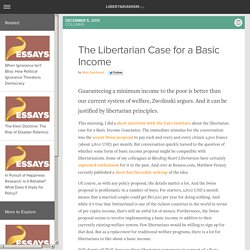
And it can be justified by libertarian principles. This morning, I did a short interview with the Cato Institute about the libertarian case for a Basic Income Guarantee. The immediate stimulus for the conversation was the recent Swiss proposal to pay each and every and every citizen 2,500 francs (about 2,800 USD) per month. But conversation quickly turned to the question of whether some form of basic income proposal might be compatible with libertarianism. In One Image, Everything You Need to Know about the Washington-Created Welfare State. November 6, 2015 by Dan Mitchell.
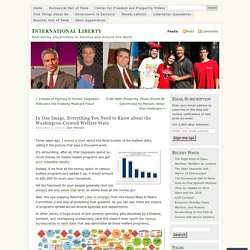
A Guaranteed Income for Every American. When people learn that I want to replace the welfare state with a universal basic income, or UBI, the response I almost always get goes something like this: “But people will just use it to live off the rest of us!”

“People will waste their lives!” Or, as they would have put it in a bygone age, a guaranteed income will foster idleness and vice. I see it differently. I think that a UBI is our only hope to deal with a coming labor market unlike any in human history and that it represents our best hope to revitalize American civil society. The great free-market economist Milton Friedman originated the idea of a guaranteed income just after World War II. Basically flawed. A Universal Basic Income Is a Poor Tool to Fight Poverty. Photo Why doesn’t the government just give everybody money?

Figure out a reasonable amount — the official poverty line amounts to about $25,000 for a family of four; a full-time job at $15 an hour would provide about $30,000 a year — and hand every adult a monthly check. The minimum-wage worker stretching to make it to payday, the single mother balancing child care and a job — everybody would get the same thing.